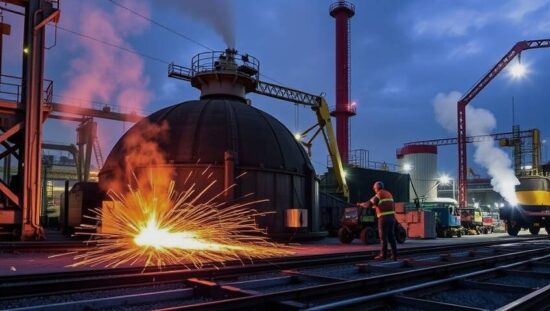German Steel Industry in Crisis, State Aid Not the Solution, Says Salzgitter CEO
The mood in the steel industry is gloomy, according to Salzgitter CEO Gunnar Groebler, who believes that state aid is not the solution. “We need fair competition and no permanent subsidies” Groebler said in an interview with the Frankfurter Allgemeine Zeitung. “Subsidies are investments in the location. We should discuss this with the parties that will be elected in the Bundestag.”
Groebler also expects support from the EU, particularly in the face of the steel glut from China, which has been a challenge for the industry for some time. “These are dumping prices. We need to put a stop to this on the EU level, possibly with tariffs or other protective measures.”
At the same time, Groebler expects trade barriers to increase overall due to the geopolitical situation, and warns: “If Europe does not adapt to this challenge, then we will be the victims of the current free trade system.”
The 52-year-old CEO, who previously led the wind energy business at Vattenfall until 2021, also sees the government with a view to the use of green steel. As long as “gray steel” which is produced in traditional blast furnaces, is still much cheaper due to the low CO2 prices, there needs to be help for green steel to gain a foothold. Then the value creation in Europe would remain, and the tax revenues that had flowed into the transformation would return, as he argues: “This is economically sensible.”
This could be achieved through “green lead markets” for example in the area of public procurement or through the design of rules in other industries. “Whether it’s bridges or subways – steel is in use everywhere. There should be guidelines that the climate-friendly steel be used. Or look at the automotive industry: there, only what goes through the tank is taken into account for the calculation of the fleet average. If you also consider the vehicle itself, you could create incentives to reduce CO2 emissions already during production, for example by using green steel.”
The energy industry is also mentioned by the steel manager. In other countries, for example, the tender for offshore wind parks requires the use of green steel for the wind turbines or transformers.
Salzgitter, the second-largest steel producer in Germany after Thyssenkrupp, remains committed to the transformation to green steel production, according to Groebler. “By 2033, all three blast furnaces should be replaced.” Salzgitter has already received a funding commitment of around one billion euros, but the project is facing setbacks, as Groebler explained, citing the example of a delayed water pipeline to the Salzgitter site, which will not be completed until 2029.
Meanwhile, Salzgitter has become heavily indebted in the process of transforming, as it had planned investments of around 1.3 billion euros in the trust that the funding would be available. The banks stand by the transformation project, “Salcos” as Groebler said, having extended the consortium loan to 2030 at the same conditions as before: “This is already a strong signal.”
Groebler therefore sees no need to offer the large stake in the copper producer Aurubis, worth over one billion euros, as collateral to the banks, or to sell it: “This question does not arise. From the perspective of the supervisory board at Aurubis, I can say that I am very satisfied with the company’s performance and support the strategy. Of course, there were difficult times in the last 24 months. But the new management is working very positively in the company and is leading it with a steady hand.”
As for the fact that the drugstore owner Dirk Roßmann has become the second major shareholder of Salzgitter, Groebler does not want to comment in detail. “I’m happy if Mr. Roßmann shares my view on Aurubis and sees potential in this company. But he doesn’t ask me for advice and I don’t want to engage in speculation about his intentions. I have no current contact with him.”
Despite all the crises, Salzgitter is not planning a large-scale job cut, unlike Thyssenkrupp, which has put 11,000 jobs on the block. “Of course, we have difficult times and are looking at which processes we can make more efficient, and this affects certain employees as well. But there is no program like at Thyssenkrupp at our company” Groebler said to the FAZ. “We would discuss this with our co-determination before going public with it. We have always pushed the topic of efficiency forward. And maybe that’s the reason why we don’t have to grasp at straws as much.





